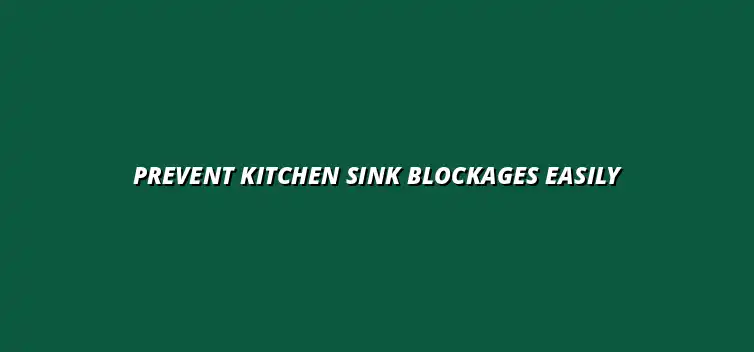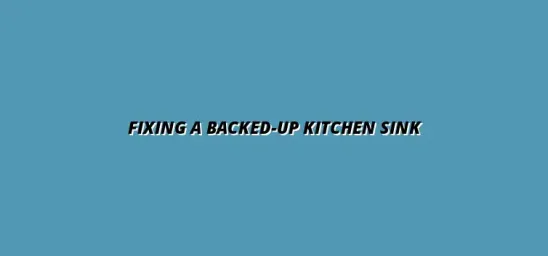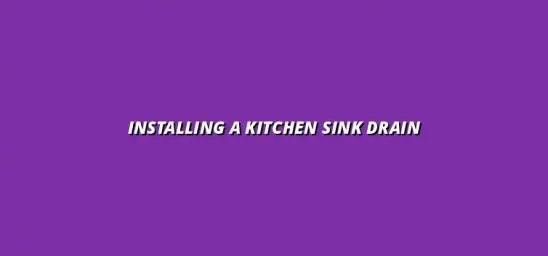
Prevent Kitchen Sink Blockages Easily
Effective Strategies for Preventing Kitchen Sink Blockages
Understanding Kitchen Sink Blockages: Causes and Consequences
Common Causes of Kitchen Sink Blockages
Kitchen sink blockages can be quite the headache! The most common culprits include grease, food particles, and soap residue. Pouring grease down the drain may seem harmless, but over time, it hardens and creates a sticky mess that traps debris, leading to clogs.
Other frequent offenders are coffee grounds and starchy foods like pasta and rice. Remember, your kitchen sink isn't a trash can, and putting these items down the drain can result in serious plumbing issues!
The Impact of Blockages on Your Plumbing System
Blockages can cause serious damage to your plumbing system. When a sink is clogged, water can't flow freely, leading to potential overflow or even flooding in your kitchen. This situation can create a breeding ground for bacteria and foul odors, making your home less inviting.
Not only does it cause inconvenience, but it can also lead to costly repairs if the blockage worsens. Being proactive in preventing blockages is essential for maintaining a healthy plumbing system!
Routine Maintenance Practices to Prevent Blockages
Regular Cleaning of Sink Drains and Fixtures
One of the easiest ways to prevent blockages is through regular cleaning of your sink drains and fixtures. This includes scraping any leftover food off dishes before washing them. Additionally, I recommend running hot water down the drain after using it to help dissolve any buildup.
Regularly cleaning the sink area and the drain itself can greatly reduce the risk of blockages. Schedule a monthly cleaning session to keep everything flowing smoothly!
Importance of Using a Drain Strainer
A drain strainer is a simple yet effective tool that can save you from future headaches. These handy devices catch food particles and debris before they make their way down the drain. It's a small investment that can pay off big time in avoiding blockages!
- Choose a strainer that fits snugly in your sink.
- Clean it regularly to prevent buildup.
- Consider using a mesh strainer for finer particles.
Best Practices for Food Waste Disposal
Safe Disposal Techniques for Leftover Food
Disposing of food waste properly is vital for preventing kitchen sink blockages. To start, scrape leftover food directly into the trash instead of rinsing it down the sink. This simple step can significantly reduce the amount of debris that enters your plumbing!
If you have a compost bin, use that for vegetable scraps and peels. It's an eco-friendly option that also keeps your drains clear!
What to Avoid Putting Down the Drain
There are several items to steer clear of when it comes to your kitchen sink. Never dispose of the following in your drain:
- Grease or fat
- Coffee grounds
- Starchy foods like rice or pasta
- Fibrous vegetables such as celery or onion skins
Remember, what goes down the drain can come back to haunt you! Keeping these items out will go a long way in protecting your plumbing.
Utilizing Natural Remedies to Maintain Clear Drains
How Baking Soda and Vinegar Can Help
Natural remedies like baking soda and vinegar can work wonders in keeping your drains clear. By pouring half a cup of baking soda down the drain followed by half a cup of vinegar, you can create a fizzing reaction that helps break down buildup!
After letting it sit for about 30 minutes, flush it all down with hot water. This method is both effective and safe for your plumbing!
Benefits of Hot Water Flushes for Drain Maintenance
Regularly flushing your drains with hot water is another great practice. Hot water can help dissolve grease and food particles that may be lingering in your pipes. Aim to do this once a week to maintain optimal drain health!
- Use boiling water for maximum effect.
- Pour it slowly to allow it to work through the pipes.
- Consider adding a few drops of dish soap for extra cleaning power.
When to Seek Professional Help for Blocked Sinks
Signs Indicating a Need for Professional Plumbing Services
Despite your best efforts, sometimes blockages occur that require professional help. Look out for signs such as slow drainage, foul smells, or frequent backups. If you notice these issues, it's best to call in the experts!
Ignoring these signs can lead to more severe problems, costing you more in the long run. Don’t hesitate to reach out to local plumbing services when necessary!
Understanding the Costs Associated with Plumbing Repairs
When it comes to plumbing repairs, costs can vary. Factors that influence pricing include the severity of the blockage, location, and the type of service needed. It's wise to get a quote beforehand, so you're not caught off guard!
- Expect an average cost ranging from $100 to $300 for clearing simple blockages.
- Major repairs may cost more, depending on the situation.
- Ask your plumber about any warranties on their work.
Frequently Asked Questions About Preventing Sink Blockages
What are the most common kitchen sink blockage offenders?
The most common kitchen sink blockage offenders include grease, food particles, coffee grounds, and fibrous vegetables. Being mindful of what goes down the drain can help keep your plumbing system running smoothly!
How often should I perform drain maintenance?
I recommend performing drain maintenance at least once a month. Regular cleaning and flushing can prevent buildup and keep your sink flowing freely. If you cook frequently, you might want to do it even more often!
Long-term Solutions for Kitchen Drain Health
Keeping your kitchen drains in tip-top shape is essential for a smoothly running household. At Plumb Pro Care, we believe that investing in long-term solutions can save you time, money, and hassle down the road. With the right strategies, you can maintain the health of your kitchen plumbing system for years to come!
In this section, we'll explore effective upgrades, seasonal maintenance considerations, local resources, and best practices for homeowners aiming to prevent kitchen sink blockages.
Upgrading to Better Plumbing Fixtures
Choosing the right plumbing fixtures can significantly impact your kitchen's drain performance. Consider the following options when upgrading your sink and drainage systems:
- Sink Materials: Stainless steel, porcelain, or composite sinks can handle daily use and resist stains.
- Drainage Systems: Opt for larger diameters in your pipes to allow better flow and reduce blockages.
- Garbage Disposal Units: Installing a garbage disposal can help manage food waste more effectively.
Each upgrade contributes to a more efficient kitchen, ensuring that your plumbing remains clear and functional.
Benefits of Installing a Garbage Disposal Unit
Garbage disposals are a handy addition to any kitchen. Here are some benefits of installing one:
- Reduces Food Waste: It helps break down food scraps, making disposal easier.
- Minimizes Odors: It helps keep your kitchen smelling fresh by managing food waste properly.
- Improves Drain Health: Properly used disposals can prevent clogs by ensuring food is disposed of safely.
At Plumb Pro Care, we can assist you in selecting and installing the best garbage disposal for your needs!
Seasonal Considerations for Kitchen Drain Maintenance
Seasonal changes can have a surprising impact on your plumbing. Being proactive can help prevent problems before they arise. Here’s what to consider throughout the year:
- Spring Cleaning: Conduct a thorough inspection of all plumbing fixtures and drains.
- Summer Dangers: Watch out for increased usage during family gatherings and prepare accordingly.
- Fall Preparations: Schedule maintenance before winter to avoid freezing pipes.
- Holiday Readiness: Clear out the drains before big cooking events to handle the extra waste.
These proactive steps help ensure that your plumbing remains healthy through the seasons!
Proactive Steps to Take Before Major Holidays
Before hosting friends and family, it’s wise to prepare your kitchen drains. Here are some simple steps:
- Inspect and Clean Drains: Clear any debris or buildup from your sink and disposal.
- Test Fixtures: Ensure all faucets and disposals are working properly.
- Stock Up on Supplies: Have drain cleaners and maintenance tools on hand, just in case.
Taking these steps can help prevent last-minute plumbing emergencies!
Community Tips and Local Resources for Plumbing Care
Engaging with local plumbing services and community resources can provide valuable insights. Here’s how to take advantage of these connections:
- Local Plumbing Services: Reach out to Plumb Pro Care for preventive advice tailored to your home.
- Community Workshops: Look for local workshops or classes focused on home maintenance skills.
- Online Resources: Utilize online platforms to find guides and tips about plumbing care.
Building a relationship with your local plumbing experts can provide support and peace of mind.
Finding Community Workshops or Resources on Home Maintenance
Community workshops can be a great way to learn more about maintaining your home. Keep an eye out for:
- Home Improvement Classes: These can cover everything from plumbing to electrical work.
- DIY Meetups: Engage with other homeowners to share tips and experiences.
- Local Events: Many communities host fairs or expos featuring home maintenance professionals.
These resources can empower you to take charge of your plumbing maintenance!
Summary of Best Practices for Homeowners
To keep your kitchen drains healthy, it's essential to adopt a proactive approach. Here are some key takeaways:
- Upgrade Fixtures: Invest in better sinks and garbage disposals for improved efficiency.
- Seasonal Maintenance: Prepare for each season to avoid plumbing issues.
- Community Engagement: Utilize local resources for better plumbing care.
By following these practices, you can ensure that your kitchen plumbing remains problem-free for the long haul!
Encouraging Sustainable Practices for Long-term Solutions
As we focus on maintaining our kitchen drains, it’s also essential to adopt sustainable practices. Consider the following:
- Reduce Waste: Be mindful of what goes down the drain.
- Use Eco-Friendly Products: Choose cleaning products that are safe for both your plumbing and the environment.
- Opt for Regular Inspections: Schedule maintenance with Plumb Pro Care to catch issues early.
Embracing these sustainable practices can contribute to a healthier home and environment.





Fixing a Backed-Up Kitchen Sink
Prepare Your Plumbing for Weather
Installing a Kitchen Sink Drain
When to Replace Plumbing Fixtures
Fixing a Jammed Garbage Disposal